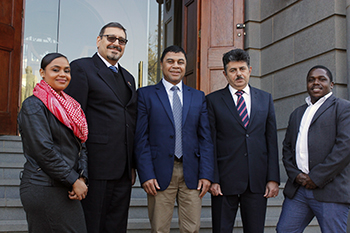Latest News Archive
Please select Category, Year, and then Month to display items
12 October 2020
|
Story Arina Engelbrecht
|
Photo Supplied
 Arina Engelbrecht from Organisational Development and Employee Well-being believes physical activity has a number of benefits for one’s health, including stress relief.
Arina Engelbrecht from Organisational Development and Employee Well-being believes physical activity has a number of benefits for one’s health, including stress relief.
Being physically active plays a big role in preventing the development of mental-health problems and in improving the quality of life of people experiencing mental-health problems.
Treatment for depression
Physical activity can be an alternative treatment for depression. It can be used as a stand-alone treatment or in combination with medication and/or psychological therapy. It promotes all kinds of changes in the brain, including neural growth, reduced inflammation, and new activity patterns are formed that promote feelings of calm and well-being. It releases endorphins – powerful chemicals in the brain that energise your spirit and make you feel good.
Physical activity can be very effective in relieving stress. Research in adults has found that physically active individuals tend to have lower stress levels compared to individuals who are less active. It also leads to improved sleep. When a person sleeps better and feels more rested, overall quality of life improves. They cope better with daily life stressors.
Reduce Alzheimer's risk
Regular physical activity can reduce your risk of developing Alzheimer's disease by up to 50%. It can also slow down further deterioration in those who have already started to develop cognitive problems. It stimulates the brain’s ability to maintain old connections as well as to make new ones.
A study asked people to rate their mood immediately after periods of physical activity (e.g. going for a walk/run, cycling, doing housework) and periods of inactivity (e.g. reading a book or watching television). Researchers found that participants felt more content, more awake, and calmer after being physically active compared to after periods of inactivity.
In conclusion, people who are physically active feel a sense of well-being, feel more energetic throughout the day, sleep better at night, have sharper memories, and feel more relaxed and positive about themselves and their lives.
“Being physically active not only changes your body, it changes your mind,
attitude, and your mood.” – Arina Engelbrecht
Palestinian Ambassador discusses future collaboration in education and development with UFS
2017-06-08

From the left: Chevon Jacobs (Office of International Affairs),
Ambassador Hashem Dajani, Prof Francis Petersen,
Chargé d’Affaires Bassam Elhussiny, and
Kanego Mokgosi (Office of International Affairs).
Photo: Eugene Seegers
Palestine’s Ambassador to South Africa, His Excellency Hashem Dajani, paid a courtesy call to Prof Francis Petersen on 30 May 2017 at the Bloemfontein Campus. Ambassador Dajani was accompanied by Chargé d’Affaires Bassam Elhussiny to congratulate Prof Petersen on his appointment as Vice-Chancellor and Rector of the University of the Free State (UFS).
The diplomatic visit entailed discussions of possible collaborative initiatives between the UFS and universities in Palestine in areas such as student exchanges, capacity building and development, and research.
Diplomacy in action - a tool for internationalisation
The UFS has in the past hosted the Palestinian delegation on public engagements held with the university community, including students and the Institute of Reconciliation and Social Justice, to showcase the socio-political situation in Palestine through the use of film and panel discussions.
The UFS has built strong networks with other foreign diplomatic missions in the country which have yielded interaction between diplomats and institutes, students and academics on the Bloemfontein Campus. These collaborations are an important tool for success of the broader university’s strategy of internationalisation.
It is through the visit of Ambassador Dajani that the university and the Office of International Affairs hopes to create firm, future strategic collaborations with Palestinian universities, academics and students.